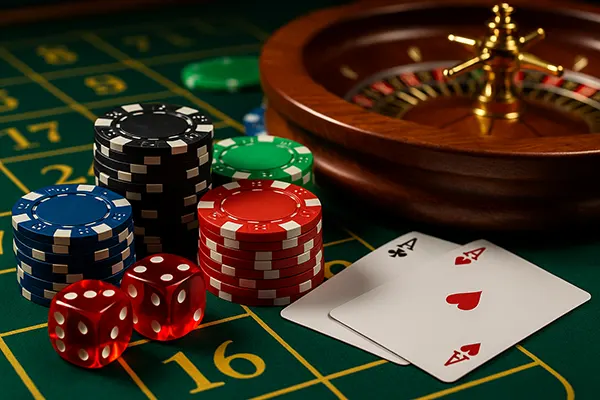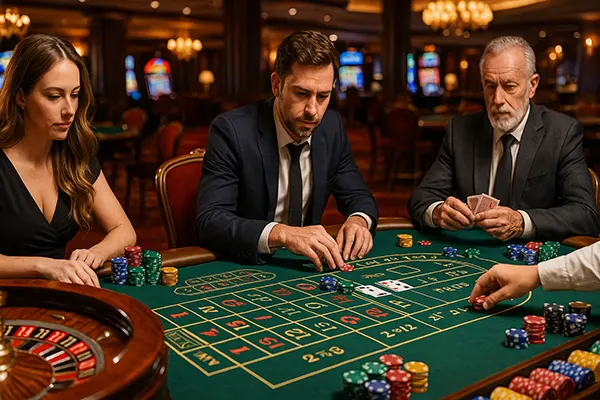How Probability Theory Works in Casino Table Games

Probability theory forms the mathematical foundation of every casino table game, defining how likely certain outcomes are and shaping strategies players use worldwide. Understanding these probabilities allows both operators and players to approach games like blackjack, roulette, or poker with logic rather than luck. In 2025, as data analytics and advanced gaming algorithms become more prevalent, the relevance of probability in gaming has only increased.
The Role of Probability in Modern Casino Games
Probability determines the expected results in every table game, from the spin of a roulette wheel to the draw of a card in poker. Each event has a quantifiable chance of occurring, expressed as a fraction or percentage. In games like roulette, for instance, the probability of landing on a specific number in a European version is 1/37, while in the American version, with an additional zero, it becomes 1/38.
In blackjack, probability guides decisions such as whether to hit or stand. Skilled players calculate odds based on remaining cards in the shoe, improving their decisions through statistical reasoning rather than intuition. This method, supported by decades of mathematical research, turns what seems like a game of chance into one of probability-based strategy.
Casinos also rely on probability to maintain balance. The house edge — a built-in mathematical advantage — ensures profitability over time. Even if individual players win, probability ensures that, across millions of rounds, the mathematical design favours the house.
Understanding Randomness and Fairness
Randomness lies at the heart of probability theory. Each outcome in a properly regulated game must be independent and unpredictable. Licensed casinos in 2025 employ random number generators (RNGs) and advanced fairness algorithms audited by independent authorities. These systems guarantee that no manipulation occurs, ensuring full transparency.
For players, understanding randomness prevents misconceptions about “hot streaks” or “due wins.” A roulette wheel does not have memory — previous results do not affect future spins. Recognising this principle helps avoid the gambler’s fallacy, a common cognitive bias that misleads players into thinking patterns exist where none do.
Fairness in gaming depends not only on randomness but also on mathematical integrity. Regulators such as the UK Gambling Commission and Malta Gaming Authority regularly verify that probability models used by operators meet international fairness standards.
Mathematical Models Behind Common Table Games
Different games rely on distinct probability models. In poker, probability is based on combinatorics — calculating the number of possible hand combinations. For example, the odds of being dealt a royal flush in Texas Hold’em are approximately 1 in 649,740. In contrast, roulette depends on uniform probability distribution, as each spin offers equal chances for every number.
Blackjack introduces conditional probability, where outcomes depend on previous events. As cards are revealed, the remaining deck composition changes, allowing players to estimate odds dynamically. This principle underpins strategies like card counting, which rely on tracking statistical deviations over time.
Even dice games like craps use probability tables to assess risk. Players can compute exact chances for each roll outcome — for instance, rolling a seven with two dice has a probability of 6/36, or 1/6, making it statistically the most likely result.
Expected Value and Risk Assessment
Expected value (EV) quantifies the average outcome a player can anticipate per bet. Positive EV indicates a potential long-term gain, while negative EV represents a loss. In most casino games, the EV is negative for players due to the house edge. Understanding this metric helps gamblers make informed decisions and manage their bankrolls responsibly.
In blackjack, skilled players may identify situations with nearly neutral EV, especially when applying optimal strategy. Conversely, games like roulette and baccarat maintain a fixed EV determined by mathematical design, leaving little room for strategic influence.
Probability-based risk assessment also supports responsible gambling policies. By understanding mathematical expectations, players are less likely to chase losses or overestimate their winning chances, aligning with modern responsible gaming standards promoted across Europe.

Applications of Probability in Responsible and Strategic Play
In 2025, data-driven gaming has advanced beyond traditional play. Online operators now use statistical tools to promote fairness and transparency. Players also have access to analytical dashboards showing real-time probabilities and outcome histories, helping them make informed decisions.
Probability theory also plays a key role in game design. Developers use Monte Carlo simulations to model millions of potential outcomes before releasing new games, ensuring that each operates within mathematically fair parameters. This process supports compliance with global regulatory frameworks.
From a player’s perspective, learning probability improves self-control and enhances enjoyment. Recognising that luck fluctuates but mathematical laws remain constant fosters a healthier gaming attitude. Education initiatives by major regulators and responsible gaming organisations now include probability awareness as a core component.
Future Trends: AI and Predictive Probability
Artificial intelligence is reshaping how probability is applied in casino environments. AI algorithms analyse player behaviour, detect irregular betting patterns, and forecast potential risks, contributing to safer gaming ecosystems. At the same time, predictive probability models assist in personalising gaming experiences responsibly.
While AI can interpret vast datasets, it cannot alter the underlying mathematics of chance. The core principles of probability remain the same — each game must operate under transparent, regulated conditions. Future advancements will continue to rely on this mathematical backbone.
Ultimately, probability theory not only explains how casino table games function but also safeguards their fairness. As technology evolves, this branch of mathematics remains the bridge between entertainment, integrity, and informed decision-making in the global gaming industry.
